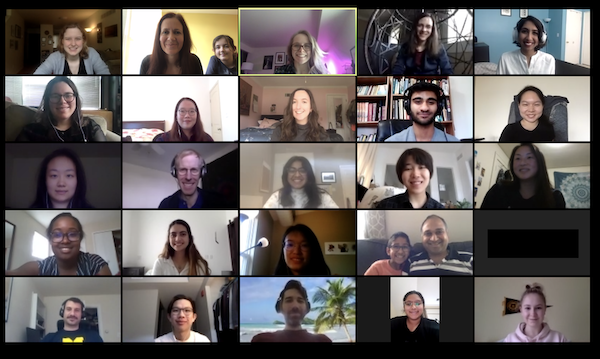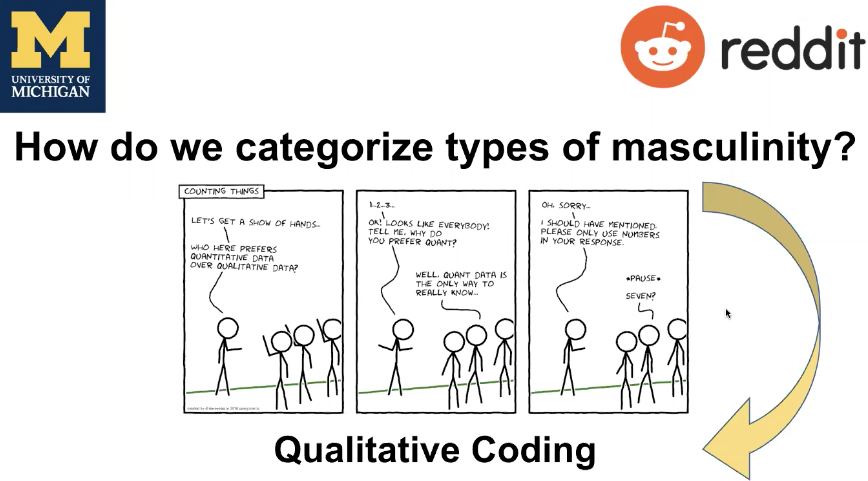CS student research and industry connections hit home – from home

 Enlarge
Enlarge
The group picture looked different at this year’s Explore Computer Science Research poster presentation and industry panel. Rada Mihalcea, the Janice M. Jenkins Collegiate Professor of Computer Science and Engineering and co-leader of U-M’s Girls Encoded program which hosted the event, asked the group to ‘say cheese’ as she took a screenshot of her Zoom screen before the industry speaker Q&A.
The program may have pivoted to an online event, but the support from sponsors, presentations from students, and sage advice from industry professionals was as strong as ever.
A part of the Explore CS Research Series, the event is the culmination of student research during the year and a chance to bring the community together.
Virtual Posters
Over 20 students presented their research on topics from approximation algorithms to modeling the trafficking of anteaters. Students walked through their research hypothesis and process, sharing lessons learned and key take-aways from their findings.

 Enlarge
Enlarge
Leigh Dennis, a computer science sophomore, used machine learning to categorize types of masculinity on Reddit, managing qualitative coding in the project. She shared, “Thank you so much to everyone who helped me through this process. I learned a lot about the field of social computing and all the processes behind it.”
Sabrina Tobar Thommel, also a CS sophomore, analyzed sentiment in tweets during the COVID-19 pandemic. Of her research experience, she says, “I learned a lot about analyzing data and using large amounts of data, in particular by using different NLP models. I also learned a lot about graduate school. I’d like to thank everyone at the Explore Computer Science program for giving me the opportunity.”
The sentiment of thanks to Laura Burdick, Allie Lahnala, Danai Koutra, and Rada Mihalcea, who spent a considerable amount of time organizing the Explore CS Research program, was echoed by many. Also appreciated by students and staff were the dozen mentors who supported CS students throughout the process.
Industry Expertise
Three U-M alumni shared their experiences as a part of the event’s industry panel.
Shirley Chen, X role at Google Brain, got her PhD from U-M in 2016 and really appreciated the student presentations. “I’m happy to see so much exciting work from the students. I didn’t expect so many different kinds of interesting work. They are doing such interesting things compared to what I recall when I was a student.”
Jada Smith joined the panel to share her path at Aptiv, where she currently serves as the vice president of advanced engineering and external relations and the director of program management North America for connection systems segments.
Brianna Cash uses her PhD in applied math scientific computing as a Research & Development Engineer at Northrop Grumman.
Industry versus academia was a big topic of conversation for the panel, from the differences in research to deciding between graduate studies or going right into industry after finishing an undergraduate degree.
Shirley had her sights set on becoming faculty and went straight into a PhD program. “I didn’t feel like I was ready to work yet. I wanted to know more before choosing a job. My original goal was to be a professor, but I went into industry instead. But I feel like as long as I’m passionate about things, I think I’m doing the right thing.”
Brianna worked for two years after college, sharing that it broadened her world. Jada agreed, saying, “Being in industry helped me realize that I wanted to be more well rounded. I was exposed to a lot of different things on the technical side, which was really helpful, but at the same time, I knew that I could add a lot of value to my company and to help myself grow. As I pursued more leadership positions, and to get those leadership positions, I needed to be able to understand the broader side of the business, not just the technical aspects but the business aspects as well. So for me, I chose to go the MBA route.”
As the country works and goes to school remotely right now, the panelists were asked about the balance between professional and personal lives. Brianna and Jada shared personal experiences in shifting gears between family needs and professional opportunity.
Jada acknowledged these challenges: “Honestly this is something I struggled with a lot throughout my career, especially earlier. I felt guilty for wanting a career and I felt guilty for wanting to be a good mom. How can you balance both? Really, you can’t. But what you can do is you can balance each and every moment.”
Brianna concurred, sharing, “ One of the ways that I’ve been able to [balance both] is I don’t work full time anymore. I work 30 hours a week, and sometimes even less than that. And luckily I’ve had managers and mentors around who’ve been within the company who have been totally supportive as I’ve taken different levels or different ambitions with my career.”
When asked what their most valuable experiences were as undergrads, they all responded overwhelmingly that it was the internship experience they had.
When it came to the most rewarding part of their jobs, it had to do with making a difference and with the students on the call. Brianna shared, “It’s working with all these new hires coming up, learning from them, trying to pass on something to them, and them really keeping me on my toes as far as things evolve and change.”
And a thank you
Moderator Laura Burdick closed the meeting with a big thank you to the companies sponsoring the event and the series. “We express our thanks to our sponsors, Google, Aptiv, Northrup Grumman, and JP Morgan Chase. A big thank you also to Google for sponsoring the whole program. We would not be doing this panel or this program without those sponsors. We’re very grateful for their support.”
 MENU
MENU 
